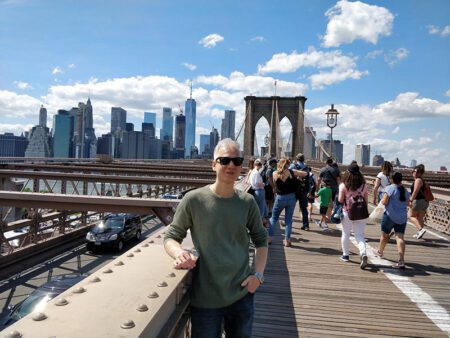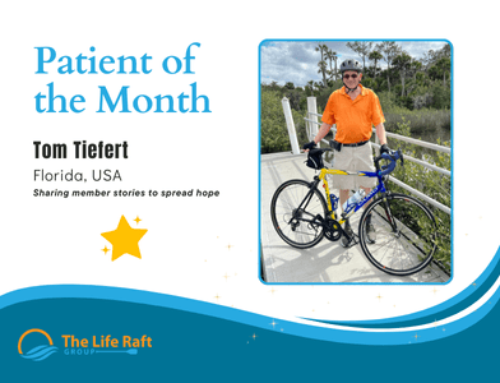Let’s be frank. 2020 and 2021 were not most people’s idea of a normal year. Being positive, reframing our expectations, and creating self-care techniques for coping may be things that you’re had to cling to in order to make it through these difficult times. What is the value of a positive attitude? Does having a positive attitude bring a positive result when it comes to cancer? Here’s one patient’s story that may help you see what a positive attitude/lifestyle can bring to the table when thriving with GIST. Jimit Mody was 24 years old when he came face-to-face
with cancer.
 Born and raised in India, Jimit was living with his family in Maharashtra, India, in 2016 when he began experiencing a constant, sharp pinching pain in his abdomen. It wasn’t unfamiliar to him – he’d had an episode of like this once in 2015 but after blood tests and an ultrasound the result was that he was prescribed medicine for acid reflux. This issue was considered cured, and was forgotten, until the same pain recurred a few months later. Jimit had been busy making plans to come to the United States to study for his master’s degree at SUNY Binghamton in New York State. These plans were put on hold because this episode caused Jimit’s doctor much more concern and tests were ordered to investigate further. A CAT scan revealed four large masses. Jimit’s doctor and radiologist
Born and raised in India, Jimit was living with his family in Maharashtra, India, in 2016 when he began experiencing a constant, sharp pinching pain in his abdomen. It wasn’t unfamiliar to him – he’d had an episode of like this once in 2015 but after blood tests and an ultrasound the result was that he was prescribed medicine for acid reflux. This issue was considered cured, and was forgotten, until the same pain recurred a few months later. Jimit had been busy making plans to come to the United States to study for his master’s degree at SUNY Binghamton in New York State. These plans were put on hold because this episode caused Jimit’s doctor much more concern and tests were ordered to investigate further. A CAT scan revealed four large masses. Jimit’s doctor and radiologist
told him there were three possibilities –
1) it could be something malignant,
2) it could be something benign, or
3) it could be tuboglossis tuberculosis.
A fine needle biopsy was scheduled, and the tumor sample was sent to a special lab in the capital city of Mumbai.
With test results that showed a GIST diagnosis, positive for C-KIT but negative for any other mutation, Jimit was referred to a medical oncologist in Mumbai who reassured him that it wasn’t an aggressive type of cancer and that there were treatments available. Neoadjuvant imatinib was prescribed and scans would be done six weeks later. Faced with this new reality, Jimit decided to ask for and was granted deferred admission to his master’s program. Jimit’s reaction to this all this might be typical, but his determination to move forward is noteworthy.
“It was a big shock, a terror. I was down at first, but acceptance came in. I thought ‘this is a speed bump and I’ll get over it.’ There are many more important things to do. I will take care of this but I will get on with it [life],” said Jimit.
Jimit and his brother (and a few family members) dove into the internet to do research on GIST as well as getting a consult from a family member who is a gastrointestinal surgeon.
“My older brother and I are very inquisitive by nature, so we started Googling stuff and reading articles in various scientific journals and we understood that since I was just KIT positive and negative for all else, it means wildtype, as per the pathology, so we questioned continuing the imatinib, but it is considered the first line of treatment,” shared Jimit.
Jimit’s family rallied with everyone lending their support researching this disease and talking to people about it.
At six weeks, scans showed a 5-10% reduction in the tumors, but by the next scan there were no more positive changes, and one of the tumors showed signs of growth. Surgery was performed in September 2016, and it was complex – a partial gastrectomy, splenectomy, gastrojejunostomy, and a debulking of the peritoneum.
“I began imatinib again about a month after the surgery. I was recovering well. After surgery, I met with a naturopathic practitioner, who was a yoga teacher who also helped me develop a customized diet based on my body type, my blood group, what my tendencies are, and what my history is. And he worked with me to detox and clean up my entire system after the surgery,” he said.
In January 2017, Jimit had his first post-surgery scans, and they were clear. Though Jimit had a new nutritional regime and his body was healing well with yoga, enriched by positive affirmations and exercise, he searched for answers to the real questions about GIST.
“The scans after surgery were clear, NED, and that was good, but at the same time, we wanted to get to the root cause of the disease. And as you know we don’t know the root cause of GIST. I continued the naturopathic practice and added ayurvedic practices1 and Tibetan medicine2, a 2000 plus year-old science. They do urine and pulse analysis and give you natural herbal medicines. We were trying to prevent it from coming back. These practitioners did not believe these methods would interfere with the traditional medicine,” Jimit said.
In conjunction with Jimit’s desire to know more about GIST and what might be next, his oncologist sent tissue samples to the United States to several labs for a second opinion on the pathology of his tumors. One confirmed the Mumbai lab’s findings and another gave him more information – he had SDHB-deficient GIST. His local oncologist felt Jimit should continue imatinib since he’s had few side effects and his scans were still clear. That doctor also felt that Jimit was ok to continue all the alternative therapies he’d been doing. Jimit was still doing well in April of 2017, and made the decision to leave his job and backpack across northern India with some friends.
He commented on this decision:
“It was part of the country I’d never visited before. Mountains, waterfalls and lakes. I was with a couple of good friends. I wasn’t sure I’d be able to do any of the trekking since I had just had major surgery, but I did well. I think the diet and the yoga, and my age helped. I just needed some ‘me time’.”
After his travels, Jimit began to make preparations to travel to the United States in August to begin his studies at SUNY. He was nervous about leaving his family and moving to a new country and living with GIST on his own, and though his family was sad to see him go, they were very supportive. Everyone felt reassured when Jimit’s last scan before he departed was also NED.
The semester at SUNY was a blur of learning new things, getting used to a new country, making friends, keeping up with studies, part-time work, and continuing his routine of nutrition, exercise, and mental health practices that Jimit knew worked for him living with GIST. By the end of the semester, Jimit was quite homesick and he made plans to travel home for the holiday break. While he was at home, he got his scheduled scan and unfortunately is showed multiple spots of activity. An MRI and PET scan confirmed that it was a recurrence as well as several metastases in the abdomen and the liver. His local oncologist discontinued the imatinib due to the new growth and recommended that since he was living in the US he should explore what doctors in the United States were doing as far as research and clinical trials in SDH-deficient GIST.
And explore he did. Jimit’s case was evaluated by doctors in Boston and New York City, with, and eventually, in the search for answers, Jimit spoke with doctors in Portland, California, Florida, and even Germany. Jimit’s oncologist prescribed Sutent which he took without too many side effects until a few months later, but they were tolerable. A consultation with Jimit’s natural and alternative medicine practitioners led to some changes, and scans and bloodwork continued regularly. In his quest to find more information on SDH, Jimit attended the Pediatric & Wildtype Clinic sponsored by the NIH in 2018 in Washington, D.C. At this event, he met and bonded with several other young adults who were dealing with life with SDH, and this is where he met Sara Rothschild, Senior Vice President of Program Services for the The Life Raft Group as well.
“When I was at the NIH, I saw that I had nothing to complain about. I saw teenagers who were just handling it,” said Jimit.
 Jimit found a rich source of information, camaraderie and support from the staff, fellow patients, and advocates at the Clinic. Now settled in Pittsburgh in a new job, Jimit remains stable at this point and stays in touch with his new friends and in addition to many practitioners across the country who are keeping abreast of his case and who he relies on for their expertise. Jimit shared that he’s learned a lot about himself since his diagnosis.
Jimit found a rich source of information, camaraderie and support from the staff, fellow patients, and advocates at the Clinic. Now settled in Pittsburgh in a new job, Jimit remains stable at this point and stays in touch with his new friends and in addition to many practitioners across the country who are keeping abreast of his case and who he relies on for their expertise. Jimit shared that he’s learned a lot about himself since his diagnosis.
“It’s revealed a few traits of mine that I didn’t know that I had. The mental strength to not get bogged down by the negative. It’s made me look at the positive side of everything and be more optimistic about life. I don’t wish to toot my own horn, but I’ve been able to be very disciplined with my diet and lifestyle, working as a student, and balancing that with my studies with decent grades. Nothing is impossible. And at the same time it made me realize that I don’t have to take life so seriously all the time. I have learned to also live in the moment. To talk to more people, say my positive affirmations, not be scared of challenges, learn to pick myself up, look forward and to find solutions. These are things that I had to learn because I had to deal with life and death so young.”
Jimit also says that for those newly diagnosed, they need to understand that, “Being afraid is not wrong. We’re all human. But keep a positive mindset – I have this, I accept it and now let’s move on, what can we do now? Be happy and be free. Convince your body that you’re fine. I take a positive approach to everything. If I had stayed down because of my illness, my parents’ death, financial issues, it would have slayed me. Don’t give up, just go for it. Keep a mindset that you’re going to beat it.”
A normal reaction to a cancer diagnosis and cancer treatments is depression and sadness and though positivity will not cure you, when you are ready to adapt one, a positive mindset can help you manage your adherence to a self-care routine and enhance your mental health as you live with GIST. If you are new to a cancer diagnosis, or caretaking, or are at any point in your GIST journey, please know that there are many resources available to support you in any way you need.
The Life Raft Group offers virtual support groups for patients and a separate gathering for caregivers available to all. Across the country patient and caregiver groups meet with LRG State liaisons at in-person support meetings (depending on current covid restrictions).
We also have a GIST Mentor Program where patients are matched with patients with similarities (age, mutation, etc.), and caregivers with other caregivers for support and encouragement one-on-one. Online, LRG Members can access GIST Chat, a private, email community with patients and caregivers who discuss everything under the sun that a GISTer may encounter. Across Facebook there are several private groups for GIST: GIST Survivor is moderated by The Life Raft Group is a forum for more than 1000 patients/caregivers. There are also many regional groups of GISTers as well for Australian, Asian, and Latin America.
Be sure to look through our website for information on mutation testing, upcoming events and handy charts for the newly diagnosed are accessible. You can also find dozens of videos on all aspects of GIST on our YouTube page. If you need to speak with someone about your pathology test, finding a GIST expert, or about getting mutational testing, please email liferaft@liferaftgroup.org or call 973-837-9092.
References:
1 Ayurveda – Ayurveda, or ayurvedic medicine, is a healthy-lifestyle system that people in India have used for more than 5,000 years. Ayurveda emphasizes good health and prevention and treatment of illness through lifestyle practices (such as massage, meditation, yoga, and dietary changes) and the use of herbal remedies. Ayurvedic theory states that all areas of life impact one’s health, so it follows that the Vedas cover a wide variety of topics, including health and healthcare techniques, astrology, spirituality, government and politics, art, and human behavior. University of Michigan, https://www.takingcharge.csh.umn.edu/where-ayurveda-come-from/
2 Tibetan medicine – Tibetan medicine teaches that the purpose of life is to be happy. By using Tibetan medicine for self-care, you will become aware of how your thoughts and behaviors influence your health and happiness. University of Michigan, https://www.takingcharge.csh.umn.edu/philosophy-tibetan-medicine/



